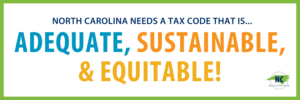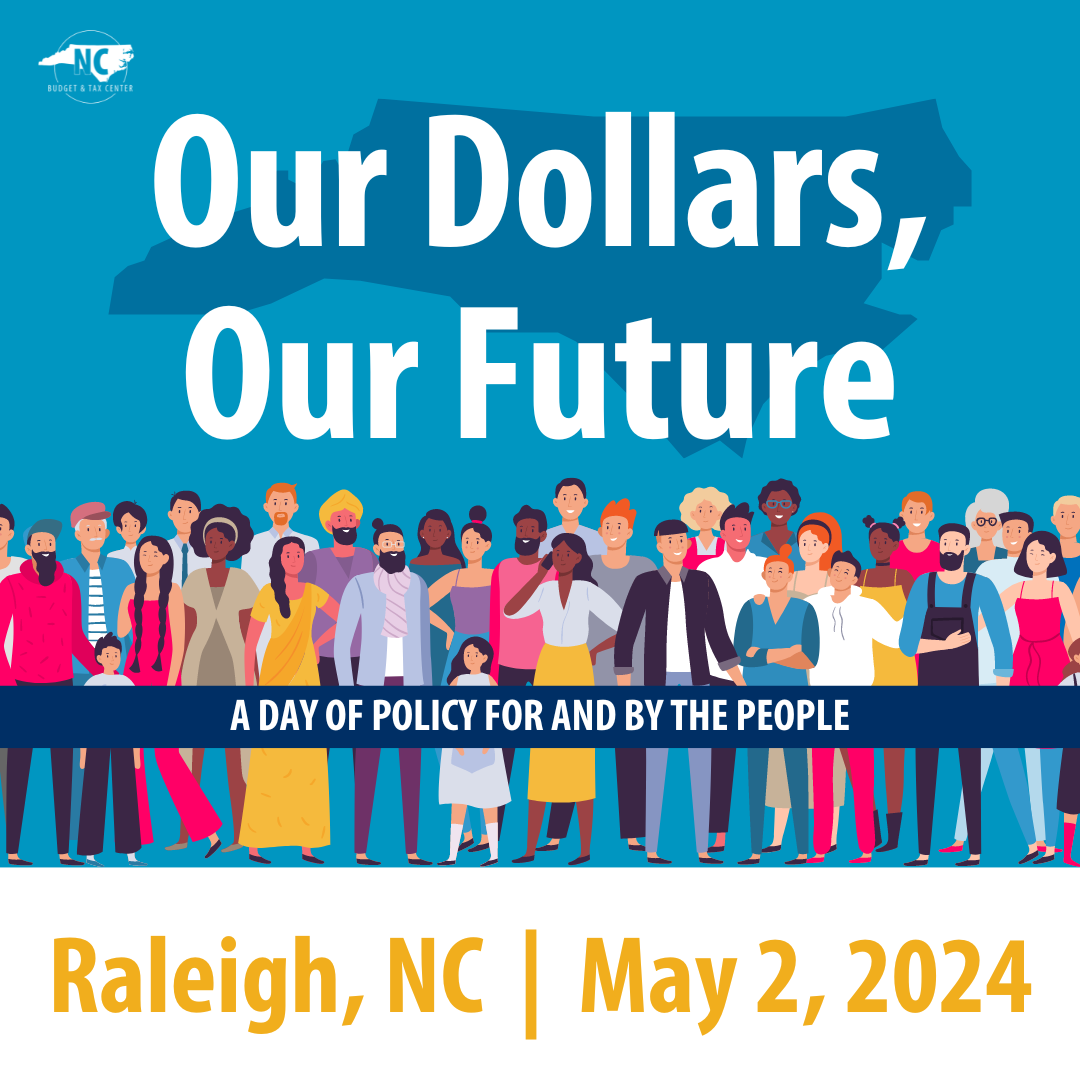Taxes are the way we deliver a better future across North Carolina
In communities across the state, most North Carolinians share the same values for our future. We envision a North Carolina where our children can grow up to reach their full potential, where families have the resources to care for their loved ones, and where local entrepreneurs can bring new ideas to market and create high quality jobs in every corner of the state.
Tax Day is a reminder of how we guarantee this future for every North Carolinian—Black, brown and white, indigenous and immigrant—in communities throughout the state. By coming together across lines of difference and contributing our fair share, we can adequately fund the quality of care that our neighbors and elders deserve, schools where our children can excel, and communities where homegrown businesses can thrive and do right by their employees.
But a decade of reckless tax policy threatens this shared vision for our future. When massive corporations and the wealthy few get rich off of our communities without paying what they owe, it’s North Carolina’s parents, caregivers, teachers, and small business owners who bear the consequences.
Together we hold the power to forge a new path forward for our communities by putting a stop to North Carolina’s dangerous tax policies. We can start by flipping the script on harmful anti-tax rhetoric and lifting the value that our collective contributions deliver to communities. And we can commit to holding our lawmakers accountable to a more equitable approach to tax policy that reflects the shared values and interests of our communities.
Without action, 2025 will begin an acceleration towards zero income taxes
North Carolina’s legislative leaders are marching us to zero income taxes over this decade with scheduled reductions of both corporate and personal income tax rates. In 2025, the corporate income tax rate will be cut from 2.5 percent to 2.25 percent while the personal income tax rate will also be reduced from 4.5 percent to 4.25 percent. Given that income taxes represent more than half of the state’s public money each year, the decision to reduce income taxes puts the right to a quality education, the health care of hundreds of thousands of working people and families, and job opportunities for working parents and young people at risk.
The choice that North Carolina lawmakers face on tax policy is clear. Politicians can enact a reckless income tax cut that allows massive corporations and their ultra wealthy executives and shareholders to pocket over $2 billion in public funding, or our legislative leaders could instead cut child poverty by a THIRD with a Child Tax Credit available to most families.
The choices elected leaders make on tax policy are as important to our lives as the decisions they make about who can get affordable childcare or housing.
In fact, they are directly connected. When corporations and the wealthy few pay what they owe, families in every community of the state can have what they need to meet the basics and get ahead. But without adequate levels of public funding every year, families across the state pay dearly in missed learning opportunities for their children, disruptions to their workday from unreliable transportation, and rising housing costs to name a few.
NC needs people first tax policies too
For more than a decade—decisions about how high or low taxes should be, who should pay and how much, and what should be taxed—have not been shaped by the values and priorities of the millions of North Carolina families who shoulder the burden of these decisions. Instead, our tax policy has been dictated by outside special interests and their wealthy donors hellbent on amassing record-breaking profits, irrespective of the public good.
This Tax Day is an opportunity to recognize our shared responsibility and power to hold our elected representatives accountable for tax decisions that affect us all.
North Carolinians want to see our collective effort to make lives better grow and make an impact across generations.

That is only possible if lawmakers take action to uphold some core principles of tax policy:
- It must be adequate. A tax code needs to provide funding that ensures services, programs and institutions are available to serve every community and a growing population. Adequate is the foundation for ensuring in the short and long-term that communities and people have what they need.
- It must be equitable. A tax code should not ask those with the least to pay the most as a share of their income or treat people and businesses differently. Equity in taxation should consider not just income but race to ensure that tax decisions don’t block opportunity and reinforce racist outcomes from other policy areas.
- It must be sustainable. A tax code should seek to perform over time in line with the economy and keep up with the growth in population or shifts in where economic activity is happening. A tax code shouldn’t be based on arbitrary formulas or limit future policymakers from taking fiscally responsible steps to put public funding to people’s priorities.
These tax policies aren’t just what the research shows us is important, they are also important to people across North Carolina.
- We want to see our neighbors cared for and safe, a great education and quality childcare for every family, and opportunities for higher learning and good jobs.
- We want public money to be able to fund the bridges, buses and trails that connect our communities, protect the quality of our air and water, and address public health threats from pandemics to behavioral health that undermine the well-being of everyone in our communities.
- We don’t want those with the lowest incomes to bear the largest burden in state and local taxes.
- We want profitable corporations and the wealthy few to pay what they owe.
When policymakers put forward proposals, we all need to ask:
- Who will pay? Who will get a break?
- How much public money is raised or lost? What will this mean for programs and services in our communities?
- How will the tax code keep up with community priorities or needs over time?
- What power do we all hold to ensure that our elected representatives advance tax policies that reflect our shared values and interests?
A tax code worthy of all of us
As North Carolina enters the second half of this decade, it’s time to get clear that the course we are on will undermine our future.
Families across North Carolina are looking for leaders who will represent our best interests and are willing to embrace a better approach—one that funds our future through a tax code that is adequate, equitable, and sustainable.
We are counting on leaders who will stand with North Carolina families, by committing to:
- Keep the corporate income tax that is primarily paid by highly profitable corporations operating in multiple states;
- Reform the personal income tax triggers that will continue to reduce the rate closer to zero;
- Establish a tax credit for working families worth at least 20 percent of the federal EITC; and
- Create a Child Tax Credit that cuts poverty by a third.
We can come together every day, not just Tax Day to connect the dots between the tax decisions that have been made and the realities families, homegrown businesses and people across the state face.
So today and any day when you hear that taxes are bad, take a moment to push back and push forward what we all know: we can do great things for each other when we come together, and taxes are a way we do that.
That is why we must demand elected leaders make sure our tax code is up to the task of funding our future by setting up the rules so highly profitable corporations and the wealthy few pay what they owe and families and communities have what they need.



